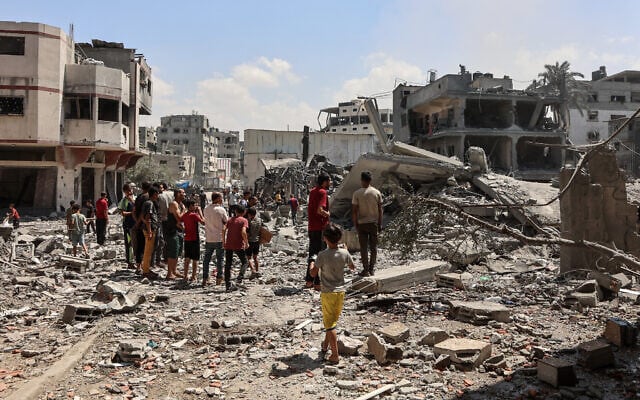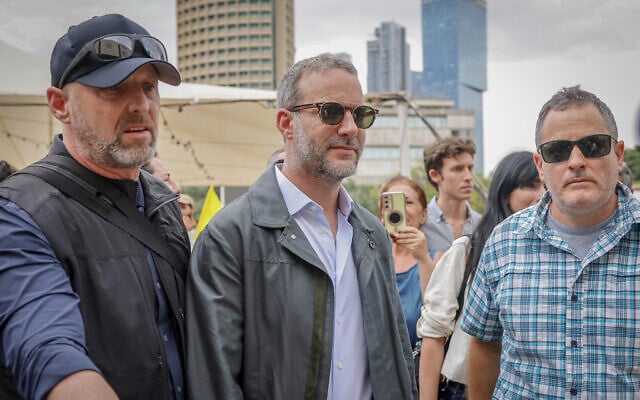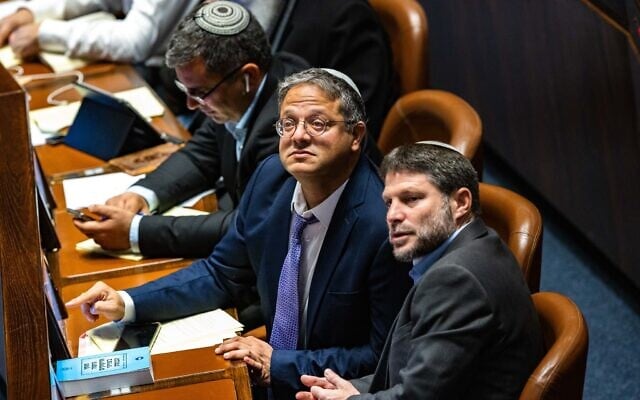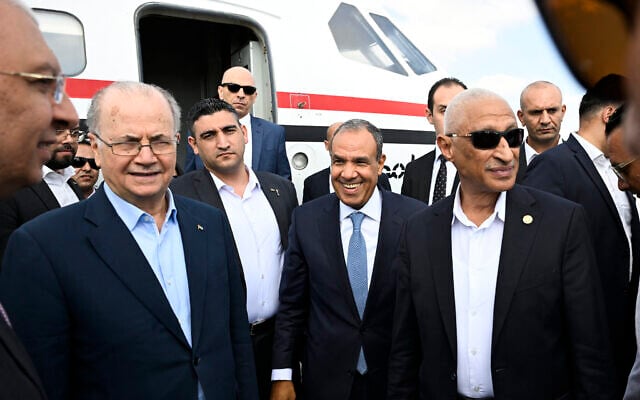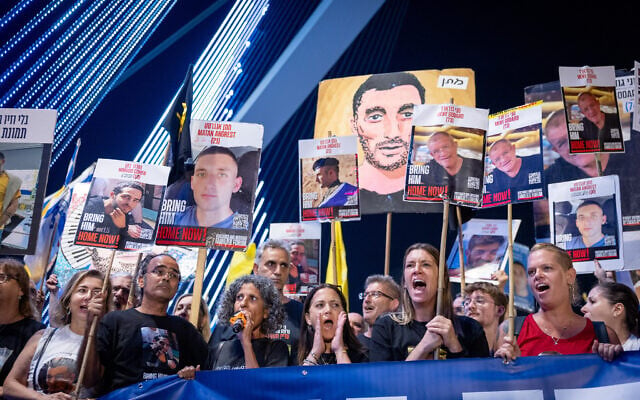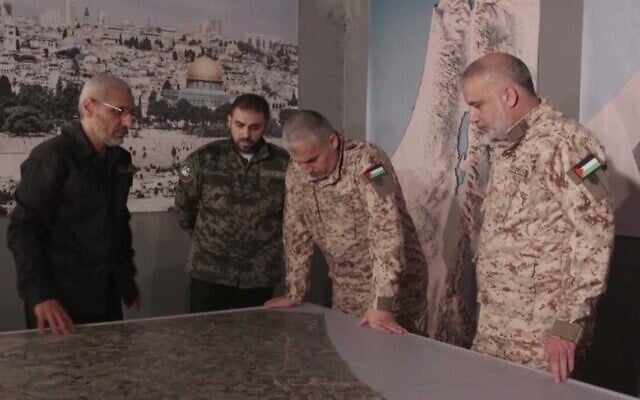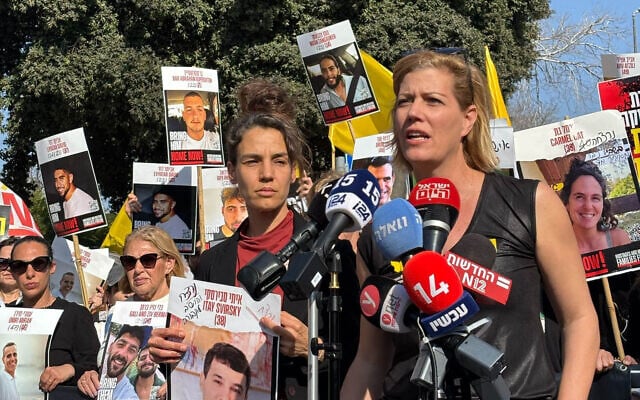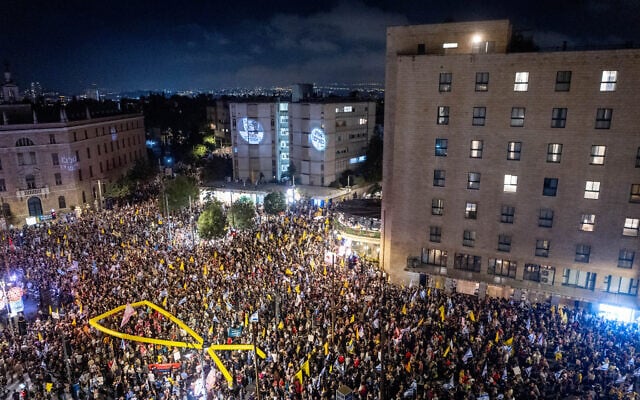

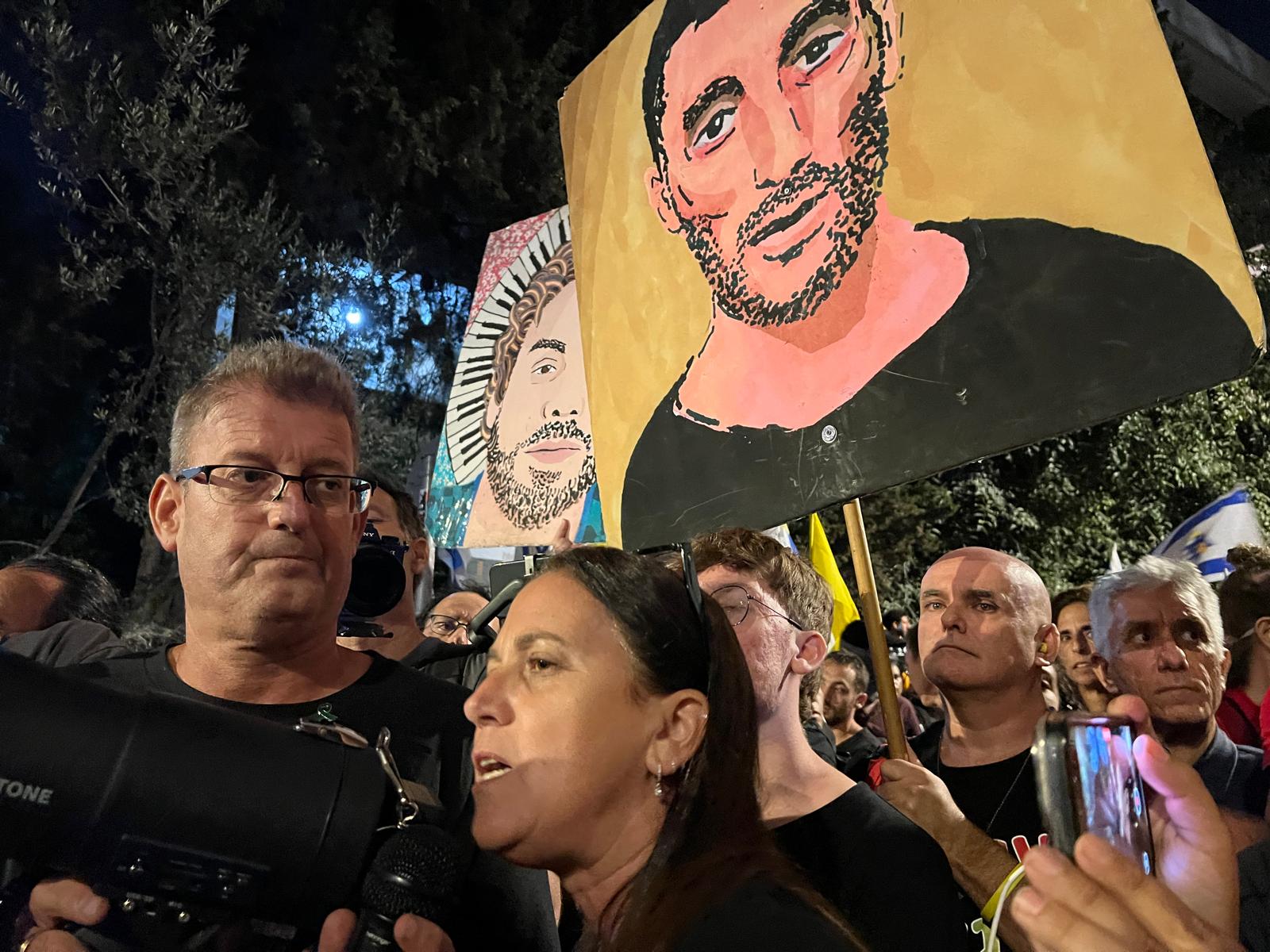
Below is a full transcript of today’s Daily Briefing:
Jessica Steinberg: Hi, welcome to the Times of Israel’s Daily Briefing. It is Monday, September 8, and I’m Jessica Steinberg.
I’m speaking today with US Bureau Chief Jacob Magid, currently in Israel. It’s day 703 of the war. Four people were killed in a terror shooting attack at the Ramot Junction in Jerusalem. The terrorists who carried out the deadly terror attack at the junction in Jerusalem were shot and neutralized at the scene. We will talk about US President Donald Trump, who on Sunday gave Hamas what he called his last warning. To agree to his terms for ending the war, Israel is reportedly seriously considering the proposal. We’ll talk about that, as well as the news that Israel has submitted a hostage deal proposal that veers away from what Prime Minister Benjamin Netanyahu has insisted for several weeks regarding the conditions for Israel to end the war in Gaza. Stay with us.
Okay, Jacob, let’s talk with what’s headlining on our pages right now. Trump’s statement, his warning to Hamas, you know, it definitely feels like there is something brewing, but it’s hard to know exactly what and how much to believe in what we’re hearing and seeing. So why don’t we first take the Trump warning and statement and you can tell us what you’ve been hearing about it.
Jacob Magid: Sure. And if it feels like it’s a bit deja vu, it’s because it is. President Trump on Sunday tweeted that this is his last warning to Hamas to agree to his terms. And he says that Israel has already agreed to his terms. So that actually is something he said before. He’s claimed that Israel’s agreed to his terms exactly not so long ago. And he’s called on Hamas to do the same. Actually, in March, you can go all the way back to March when Trump has used the term last warning to Hamas. We don’t know exactly what Trump’s terms actually are, at least that not publicly. And I can talk a little bit about the reporting of what behind the scenes what they might be. But this is a threat that Trump has issued before and also a claim that Israel has accepted what’s been on the table. He’s once again after this post that kind of came not out of nowhere because there’s been a little bit of rumbling several days ago. He also called on Hamas to release the hostages, all of them, and insinuated that he would even be willing to allow them to stay in power if they just released all the hostages.
That was basically his ask in that post several days ago. And then now today, he doesn’t get more specific on what, but basically is now threatening them as opposed to urging them in the previous one. But I think after that, it seems to me he’s more optimistic again. And he believes that there will be a release very soon. And again, something that he’s said before, if you recall, in June, July, there were several weeks in a row where he was talking about we’re a week away or two to three weeks away. And then he switched and said, actually, the whole time, I actually I knew that this was never going to work out, that once we got down to the final hostages, Hamas would not be willing to give them up because then Israel would go in and destroy. And therefore, he effectively gave this green light for Israel to move ahead with this Gaza City takeover operation that it’s kind of started to do, but not in full force, even though there’s been quite massive strikes over the past few days.
So that’s where Trump is now. He’s a lot more optimistic. What we’re understanding, I spoke with a US official and an Arab diplomat who said that basically over the last week, US President Trump and Steve Witkoff, his special envoy, were golfing together and came together with an understanding that they wanted to put another framework together or just another push for a ceasefire, because basically it’s been the Arab mediators, Qatar and Egypt, doing the heavy lifting for the past few weeks. They had gotten Hamas to agree to the previous proposal that Israel had accepted in July. And on August 18, they finally, the Arab mediators, got Hamas to get on board. But since then, as you recall, that phased framework, Israel is no longer interested in. And as a result, the US and Israeli focus has been on getting a more immediate release of the hostages instead of in batches.
And that’s basically the framework that was put together and submitted on Sunday to both Israel and Hamas. The US used a couple of intermediaries again to try to send messages to Hamas, telling them, A, that they’re willing to ensure that Israel doesn’t resume the war. So another thing that we’ve heard time and again, the concern and a need from Hamas for guarantees. And that is what they tried to assure Hamas, one, through mediators Bishara Bahbah, who they’ve used, that Palestinian-American activist who they used in recent months to try to send messages indirectly to Hamas. And now we have a new mediary named Gershon Baskin, who could be a familiar name, who’s not so new to this issue.
Jessica Steinberg: Yeah.
Jacob Magid: He was involved in the efforts to try to secure the release of Gilad Shalit in 2011 and has been maintaining contact with a Hamas official named Ghazi Hamad [Senior Member], who is based abroad, not in Gaza. And they’ve been in touch for a long time. And actually, Baskin announced publicly that he had cut his ties with Ghazi Hamad after he had the latter had talked about carrying out another October 7 attack, doing it again and again and not showing any remorse. And Gershon Baskin very publicly severed ties. But I guess they patched that up. And Baskin’s now once again been, according to a source familiar I spoke with, passing along messages between Witkoff and Hamas. It is a bit bizarre that that’s who they’re using. Only because Bahbah has also been in touch with Ghazi Hamad. That’s his contact with Hamas. So I don’t know why Witkoff is choosing to send messages to the same Hamas official. But that’s been his strategy. I’m not getting so involved directly either with Hamas. They had [US businessman and government official] Adam Boehler doing that earlier in the administration. And then once that blew up, the US stopped those direct talks. So they’re using intermediaries.
Jessica Steinberg: But Jacob, this is all, of course, and I know you pointed this out in your story. This is all, of course, away from Qatar, away from anything that’s happening in Qatar. It’s like a separate negotiating space, correct?
Jacob Magid: Correct. I think the Egyptians and the Qataris are still involved. And definitely the Egyptians, I can talk a little bit in a bit about what they’ve been trying to do over the past few days. But I think the US is keeping them apprised of what’s happening. And I do think it is using them as well, because the US believes that both the Qataris and the Egyptians have actually been very helpful in the negotiation process. And I think you had Adam Boehler, the hostage envoy for the Trump administration, who’s not very involved in these talks, but did make a statement a couple of days ago on Twitter saying that those two countries have been great. But beyond that, I think they do want to try to use all the tools at their disposal besides, I guess, getting directly involved, besides actually coming to the region and meeting with the negotiators. He did come to Israel, but that was mainly for the Gaza humanitarian issue. So this is just another effort. I, based on the conversations that I’ve had, I wouldn’t be as optimistic as Trump is right now.
And as has been the case in the past, I would say I am more cynical. But that did prove to be accurate. My understanding also is just that there’s splits between Hamas abroad and Hamas in Gaza, with the Hamas in Gaza not really trusting the US anymore because the US wasn’t able to prevent Israel from resuming the war before. And they don’t want just verbal guarantees or written guarantees. They want something more concrete. And on the Israeli side, there hasn’t actually been a cabinet discussion to to agree to this proposal that Witkoff’s talking about, that would see the immediate release of hostages, which is obviously something Israel wants. But it’s probably going to require Israel to end the war in a way that it doesn’t exactly want or isn’t exactly envisioned by [National Security Minister Itamar] Ben-Gvir, [Finance Minister Bezalel] Smotrich. So whether or not this actually even passes the Israeli side is also a question.
Jessica Steinberg: All right, let’s take a break. When we’re back, we’ll talk about yet another hostage deal proposal, one that reportedly was submitted by Israel. And it veers away from the Prime Minister’s pre-announced conditions. So stay with us for that.
Okay, so now we’ve gone through what we’ve been hearing from President Trump, what we’ve been hearing from Steve Witkoff and from the negotiators that have been involved. But then you also found out about a reported Israeli hostage deal proposal, yet another one that veers very far, in a sense, from what the Prime Minister has been saying are his absolute conditions for Israel to end the war in Gaza. So tell us how you came to that.
Jacob Magid: Sure. So this came about towards the end of last month, so about a little over a week or two ago. And the Egyptian negotiating team came to Israel and they came with the understanding that they were trying to close a deal on a phased framework, similar to the one that Hamas accepted on August 18. Israel was saying publicly it wasn’t interested, but the signals that the mediators were getting was that it actually was open to it. And that’s why they showed up in late July. But when they arrived, Israel actually came with its own proposal and not for a phased framework, but for something more comprehensive and actually agreeing to end the war as a part of the proposal on the very first day. And I’ll get into some of the details, but what’s interesting is how it just veers. The main way it veers is talking about an end to the war up front. But there are other ways. And if you just go back to what Israel, the cabinet, agreed to on August 8, so this was actually after this proposal was submitted, but the cabinet has stuck to these proposals since, despite that this proposal is still on the table, my understanding.
Basically, on August 8, there were these five conditions that Israel had set forth for what it would agree to do to end the war. The first, if you recall, was disarming Hamas completely. The second was the release of all hostages in one batch. The third is the demilitarization of the Gaza Strip. So going through all the tunnels and finding other infrastructure there that needs to be destroyed. Israeli security control over the Strip and the establishment of an alternative civilian government that is in Gaza that is neither Hamas or the Palestinian Authority [PA]. So those conditions were set and approved on August 8, and Netanyahu has issued repeated statements saying, these are my conditions for ending the war, nothing less. And this proposal that Israel and Netanyahu signed off on actually does agree to something less than that. And the concept is to have a six month, basically, framework that is also set into three stages, but does up front, in addition to Israel, Green Town, the war does see all the hostages released during the first 48 hours. That’s the time that’s given. But then you have an interesting acknowledgment in the framework. It’s only a one page document, and I think it’s kept vague in a lot of ways for in order to give Israel wiggle room, but also save space for negotiations that would still need to happen. And there’s not exactly a specific timeline for each term. But what it does note is that even though there’s 48 hours to release all the hostages, there’s a recognition that Hamas doesn’t know, unfortunately, where all the bodies of hostages that it’s still holding are located.
Israel does believe it has an idea of where most of them are. But the fact that there’s even acknowledgment on the Israeli side that Hamas doesn’t know where all of them are and gives them basically time to look for them. And that’s part of, I guess you could say, the first, second and third stage, depending on when they find those remaining hostages. But those first 48 hours, you get all the living ones out. And the first phase will also see the disarmament of Hamas’s heavy weaponry. The second phase moves to light weaponry. And then the third phase sees Israel withdraw from Gaza and to the perimeter, what is what it’s called, basically to one kilometer around the border of the Strip, including the Philadelphia Corridor. So that’s something that’s probably would be very difficult for Hamas to agree to and even the Egyptians to agree to because they don’t like the idea of Israel controlling that area. But there’s also a very long list of conditions that Israel wants to see before it agrees to fully withdraw. One of them is that Hamas returns the remaining bodies. The other is that the disarmament process is completed. Another is that you have an established governing, even the word Palestinian is used, which is pretty noteworthy, a new government in Gaza that is able to start administering the Strip.
The idea of that happening within six months also seems a little bit difficult to imagine. But what’s noteworthy also is that it doesn’t rule out the PA in the way that the cabinet proposal does. I’m not sure if that’s because, bottom line, Bibi is willing to allow for some role for the PA or he recognizes that the Arab support that he needs in order to rebuild the Strip is conditioned on PA involvement or because this is something that wasn’t passed in the cabinet. So he was able to get that through without upsetting Ben-Gvir, Smotrich. Now, the officials I spoke with said this is still a long shot proposal and they don’t agree that this is the right approach to take. But they are going to try to incorporate different aspects of it into what they’re going to be trying to do in the coming days.
Jessica Steinberg: So how does this jive with what we talked about in the first half of the podcast? Right. We’ve got there is the last warning proposal, the Hamas proposal, the proposal Hamas is currently supposedly reportedly considering. And now we have this. Do we think they’re essentially one in the same?
Jacob Magid: No, that’s something else. But I think what it shows is that there are different approaches to try to get this done. I think also you’ll see whatever the final deal is that’s really reached, it will probably incorporate various aspects of this proposal. And my understanding is that the US framework, which is a lot more general than this, does do that also does take parts of this idea that Israel put forward. But it is definitely interesting to see that some of the stuff that some of the things Netanyahu is saying publicly are not necessarily what’s happening behind the scenes.
Jessica Steinberg: Right. Right. The constant reiteration of I will only this can only happen under the conditions that you just laid out.
Now, Jacob, you are in Israel right now. You are in Jerusalem Saturday night at the weekly hostage protest in Jerusalem, not the one in Tel Aviv. The one in Jerusalem this week was much larger than usual. I was also there. The speakers included three hostage mothers, Vicky Cohen, Anat Angrest, and Einav Zangauker. The tone, I thought, was very intense, very powerful. What was it like for you to be there? And given all the news headlines that are swirling around us right now, given what we what we’re covering, what we’re talking about?
Jacob Magid: Yeah, I’m surprised I didn’t see you there, Jessica, because I was running around, not running, but walking around to really try to get a feel because this was my first time at one of these protests since almost a year ago. So it’s a very different vibe, as you mentioned, and a lot more intense. Yeah, this was the first time I’d been at one of these protests, given that I’m not based here. It’s been almost a year, I would say, since I went. And it was a very different vibe. Definitely. There’s always unique facets to Jerusalem versus going to one in Tel Aviv. And that was the last one I was at. But definitely it was very emotional to be there. I think maybe it’s something that people are used to if they go every week or it’s less emotional for them or it’s really just the same.
Jessica Steinberg: Very heavy atmosphere every week. But I think the rhetoric, as you mentioned, was incredibly bitter.
Jacob Magid: I think it was actually Elad Katzir’s sister who was a slain hostage who used the term that Netanyahu or the government is putting the remaining living hostages in front of a firing squad. That was a pretty far reaching on her part. And you had, of course, as you mentioned, the three other hostage mothers who also spoke very bitterly about their feelings with this government. And it seemed like unanimity in terms of the feeling in the crowd. I did notice at one point there was some shouting between, I think it actually was just members of the protests who obviously support a hostage deal. And there was a Channel 14 reporter, the pro Netanyahu hardline right wing network that was sent a correspondent to cover. And I think they were getting into a fight with her and each each side was telling each other to go back to Gaza. I think that’s kind of the very sad deterioration of kind of the social cohesion that we’ve seen. It was probably before the war with this judicial overhaul protest, but now definitely it’s in high drive since. I think it was helpful to get beyond the ground and see the emotions up close. I think it can help inform the way I’m trying to report on these issues from abroad. But obviously, emotions are very high right now in Israel on all sides of the political spectrum.
Jessica Steinberg: For sure. I noticed having not been there for a while, obviously there’s a much larger crowd. I didn’t even actually see all of it, but I could sense it going in different directions, down different streets. And because, you know, usually in Jerusalem, the speakers are often hostage family members or reservists or families of reservists. But this time, because it was those particular three mothers and Carmit Platy Katzir, the sister of Elad Katzir, her father was also killed. Her mother was taken hostage and brought back and died of illness and a broken heart. It was, there was a sense of, there was a sense of Tel Aviv and Jerusalem coming together. That’s kind of what I felt like on Saturday night that we haven’t seen that in a while. You know, and I look around as a Jerusalemite and I see many, many familiar faces and really from a lot of different walks of life in Jerusalem. And for me as a Jerusalemite, it’s the sense of community that you don’t get all the time any longer, but you do feel it in those moments at a weekly protest. And maybe that’s also, in a sense, as complicated as it is, people come out for that as well.
Jacob Magid: Yeah, I mean, there’s the, yes, there is obviously a breakdown in some ways, as I mentioned, of social cohesion in the country. But I think what these protests are also based off of in another way is the idea of social cohesion, that you don’t leave anyone behind. And that’s what the Israelis are showing up for on a weekly basis, despite the possible reality that this is not going to change anything. And that they’ve, I mean, they’ve seen the fact that they’ve come out every week and it hasn’t led to a deal or led to the government to make compromises that they would like to see. And yet they still show up because they feel that they are, they have a commitment to secure the release of every citizen that’s still in Gaza.
Jessica Steinberg: And that is actually what hostage family members tell me over and over again. Many of them still go, still go out to the protests, the weekly protests, most of them to Tel Aviv, but not only. And they tell me that they are very well aware that the protests may not have accomplished anything. But for them to see Israelis out there, thousands of them on a weekly basis, supporting them, backing them, it gives them that strength to go on and do what they’ve been doing. So there you have that, right?
Jacob Magid: Yeah.
Jessica Steinberg: OK. All right. Let’s call an end to this Daily Briefing.
Thanks, Jacob, for being with us. And it’s been good to have you here on this side of the ocean.
Jacob Magid: Thanks, Jessica.
Jessica Steinberg: And thanks to you for listening to The Times of Israel’s Daily Briefing. Stay tuned for tomorrow’s installment. This episode was produced by The Podwaves. Always feel free to recommend us to other listeners and rate us wherever you find your podcasts. Until next time, take care, be well, have yourselves a good week.


